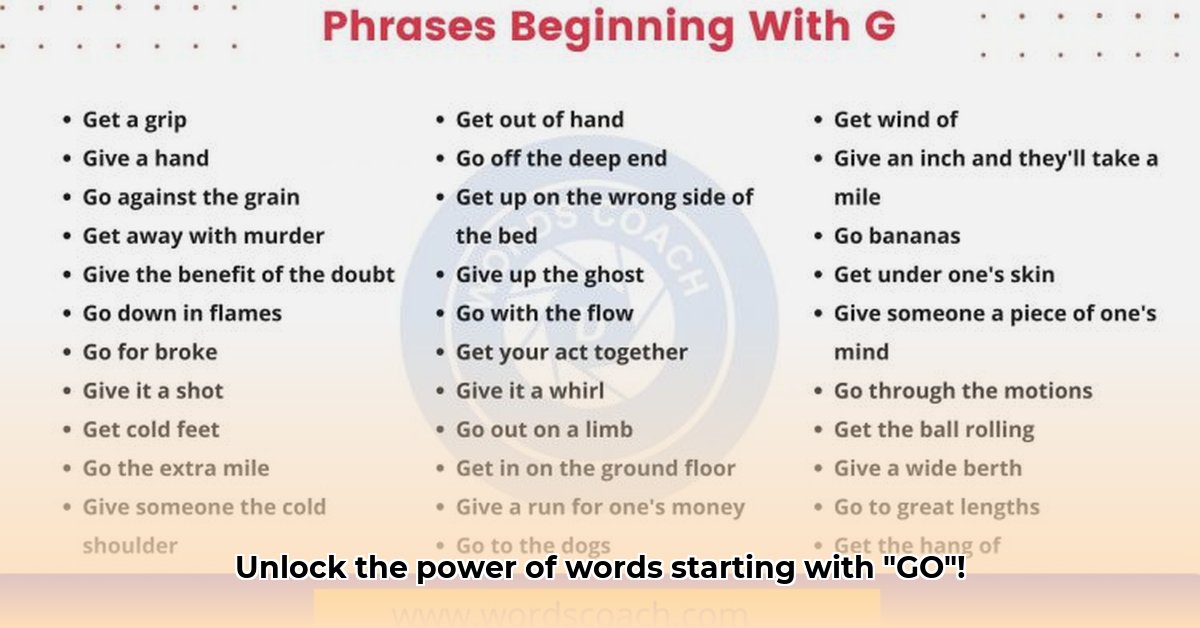From simple commands to complex medical terms, the English language is brimming with words that start with “GO.” This exploration delves into the diverse world of “GO” words, examining their meanings, usage, and even their intriguing origins. For more word exploration, check out this helpful resource: word games. Prepare to embark on a lexical adventure!
Everyday Encounters: Common “GO” Words
We begin with the familiar, the words woven into our daily conversations:
Go: A dynamic verb embodying movement, departure, and progress. Its ancient roots, tracing back to Proto-Germanic and Proto-Indo-European languages, explain its remarkable versatility. Consider its diverse applications: “Go to the store,” “Go for a run,” “Let’s go!” Each instance paints a different picture of action.
Going: The present participle of “go,” capturing action in progress. “I’m going to the movies” illustrates this continuous sense of movement.
Gone: The past participle, signifying completion or absence. “The milk is gone” marks a shift from presence to absence.
Goal: A target, an objective, a desired outcome. In project management, defining clear goals is paramount to success. “Our goal is to increase sales by 20%” showcases its role in setting a measurable target. The word’s etymology reveals a connection to the Old English gāl, meaning “obstacle” or “barrier,” suggesting the challenges one must overcome to reach a goal.
Goat: Though not etymologically linked to the verb “go,” this hoofed mammal known for its agility in diverse terrains, from mountains to meadows, adds a touch of the natural world to our “GO” word exploration. From the cashmere goat prized for its luxurious wool to the ibex scaling treacherous cliffs, goats exhibit remarkable adaptability.
Beyond the Familiar: Uncommon “GO” Gems
Venturing beyond the everyday, we encounter “GO” words that add nuance and richness to our language:
Gobsmacked: A word expressing utter astonishment, capturing the feeling of being struck speechless by surprise. Winning the lottery, witnessing a breathtaking natural phenomenon—these experiences might leave you gobsmacked.
Goggle: To stare with wide-eyed wonder, often in amazement or disbelief. A child mesmerized by a magic trick, a tourist gazing at a towering skyscraper—these scenarios exemplify the act of goggling.
Goitre (or Goiter): A medical term denoting an enlarged thyroid gland, highlighting the presence of “GO” words within specialized fields. This condition, often caused by iodine deficiency, underscores the connection between language and health.
Golf: A globally popular sport played with clubs and a small ball, its origins shrouded in friendly debate, with claims from both Scotland and the Netherlands. From casual weekend rounds to professional tournaments, golf’s allure spans cultures and generations.
Good: A word encompassing desirable qualities, moral uprightness, and effectiveness. “Clear communication is good in project management” illustrates its application in assessing quality. The word’s Proto-Germanic origin, gōdaz, meaning “fitting” or “suitable,” speaks to its broad applicability.
Gone astray: A phrase describing deviation from a planned course or purpose. “The project has gone astray due to unforeseen circumstances” demonstrates its use in conveying a shift from the intended path.
A Deeper Dive: Exploring Etymological Roots
Delving into the origins of “GO” words unveils fascinating linguistic connections:
Go: This fundamental verb’s journey through time connects it to Proto-Germanic gan, meaning “to go,” and ultimately to Proto-Indo-European ghe-, signifying “to release” or “to let go.” This etymological tapestry reveals the word’s inherent connection to movement and change.
Goad: To provoke or urge someone into action, often with persistent persuasion. Originating from the Old English gād, referring to a pointed stick used to prod animals, the word’s meaning has extended to encompass metaphorical prodding.
“GO” Words Across Contexts: From Creative Writing to Business Jargon
The adaptability of “GO” words extends across various domains:
Creative Writing: “GO” words like “gorgeous,” evoking stunning beauty, and “gloom,” painting a picture of darkness and despair, enrich narratives and evoke powerful imagery.
Business Communication: Terms like “go-ahead,” signifying permission to proceed, and “go-live,” marking a product launch, demonstrate the concise and action-oriented nature of “GO” words in professional settings.
The Ever-Evolving “GO” Landscape
This exploration offers a glimpse into the rich tapestry of “GO” words, a testament to the dynamic and ever-evolving nature of language. From common verbs to specialized jargon, “GO” words permeate our communication, adding depth, nuance, and a sense of action.
- Discover Johnson Island: Civil War POW Camp’s Untold Stories - April 30, 2025
- Discover Medieval Castle Designs: A Complete History - April 30, 2025
- Medieval Houses: A Social History Through Architecture - April 29, 2025
















